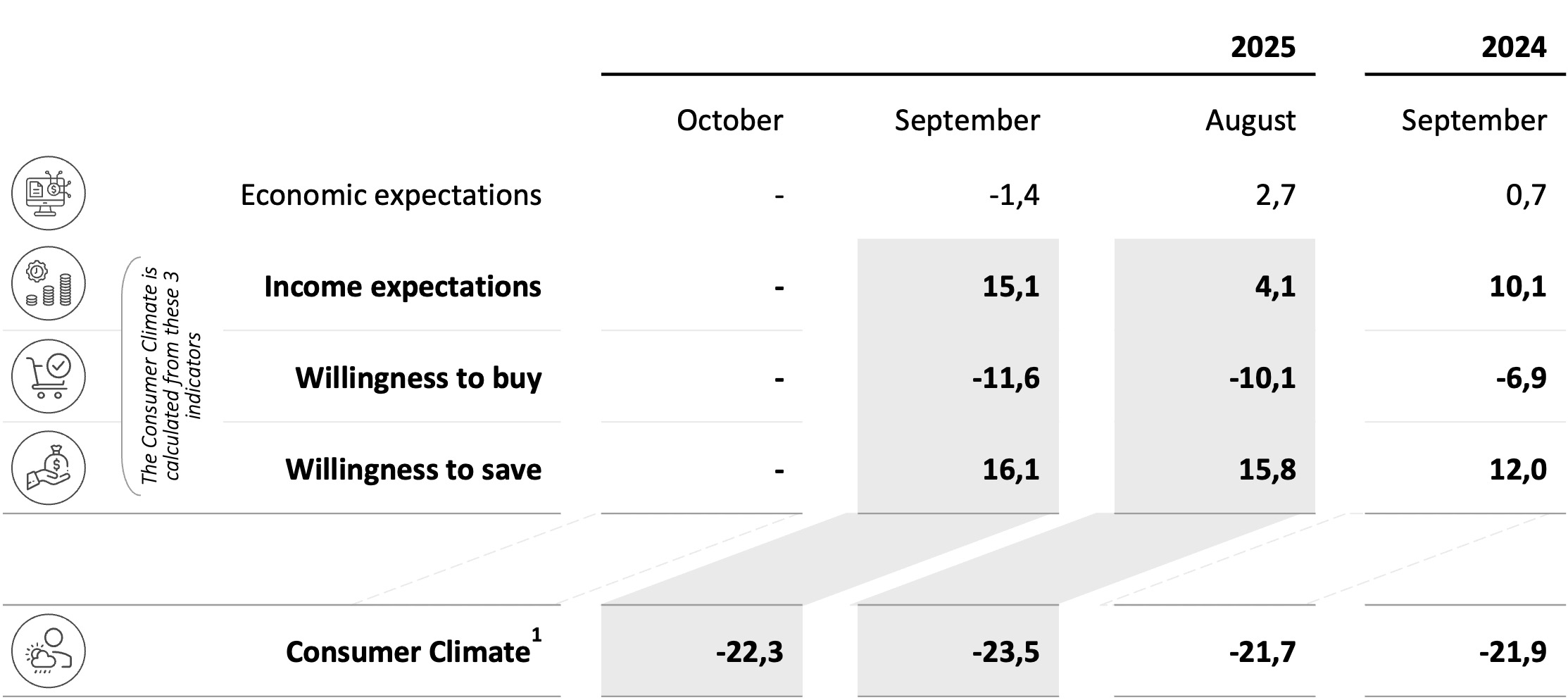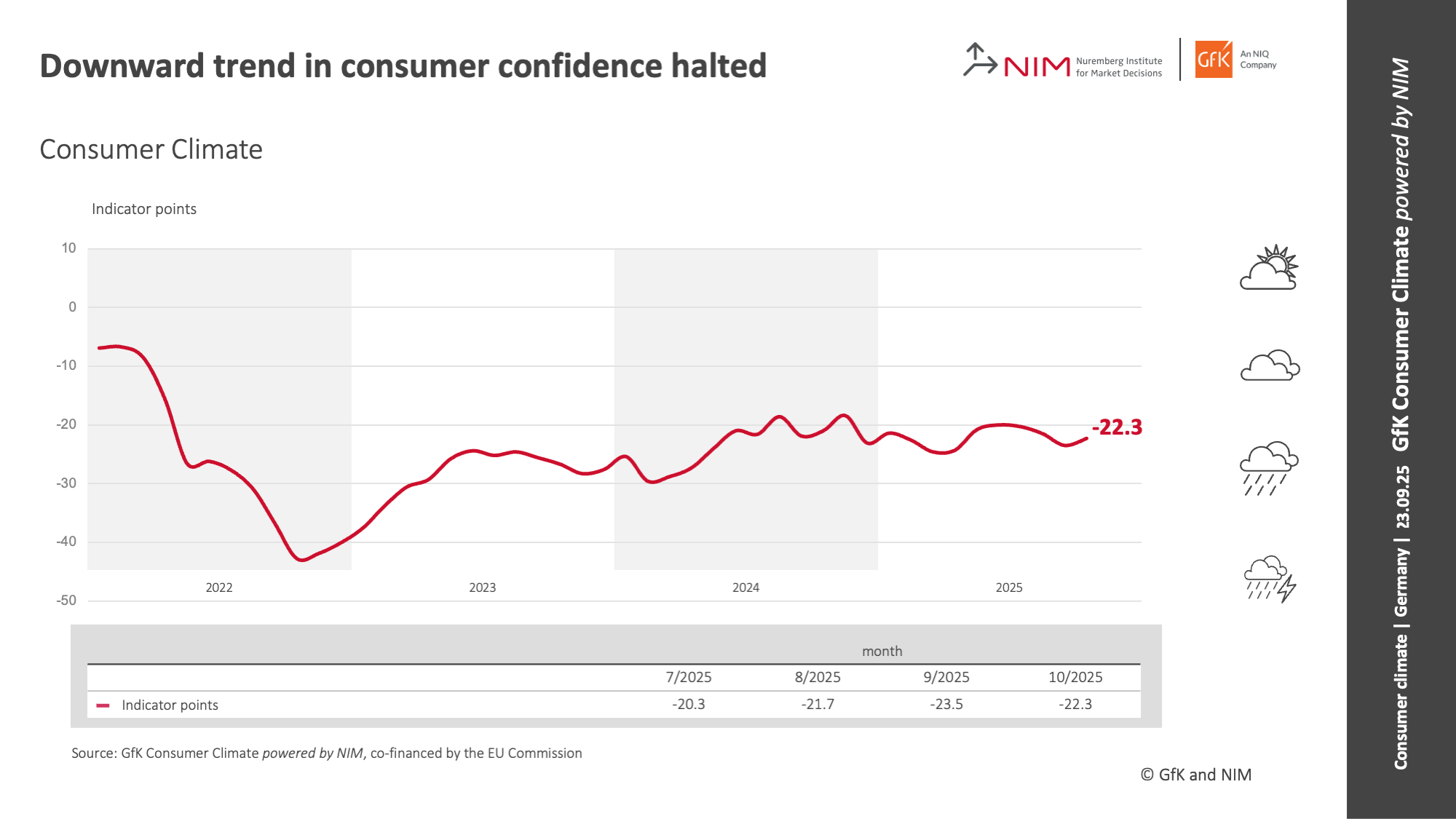Publications
2025
Consumer Climate: Better Income Expectations Stop Downward Trend
Nuremberg, September 25, 2025 – The consumer climate has stopped its downward trend. The reason for this is improved income expectations, which have risen noticeably compared to the previous month. In contrast, both economic expectations and the willingness to buy continue to decline. The willingness to save remains virtually unchanged. As a result, the consumer climate indicator for October 2025 forecasts an increase of 1.2 points to -22.3 points compared with the previous month (revised -23.5 points). These are the findings of the GfK Consumer Climate powered by NIM, which has been published jointly by NIQ/GfK and the Nuremberg Institute for Market Decisions (NIM), the founder of GfK, since October 2023.
The rise in income expectations is the main reason for the current improvement in the Consumer Climate indicator. Neither the slight decrease in the willingness to buy nor the willingness to save, which remains virtually unchanged from the previous month, are making a positive contribution.
“After falling for three months in a row, the Consumer Climate has now ended its downward trend – at least for the moment,” explains Rolf Bürkl, Head of Consumer Climate at NIM. "Income expectations – a key factor influencing the Consumer Climate – improve from 4 points to 15 points, offsetting the decrease of the previous month. Whether this marks the beginning of a sustained turnaround is more than uncertain. The consumer climate remains at an extremely low level. The geopolitical situation, concerns about jobs, and renewed fears of inflation are likely hinder a thorough recovery at the moment."
Willingness to buy decreases slightly
However, the willingness to buy is not benefiting from the significant increase in income expectations: it has actually fallen by 1.5 points to -11.6 points. This is the lowest value since June 2024, when -13 points were measured.
This means that the level of willingness to buy remains extremely low. High food and energy prices cause continued reluctance to buy. In addition, the geopolitical situation increases uncertainty and makes it difficult for consumers to plan ahead. As a result, many consumers currently consider it inadvisable to make major purchases (e.g., furniture or electrical/electronic appliances) in view of the general economic situation.
Economic expectations continue to dampen
German consumers' economic expectations for the next 12 months continue their downward trend in September. This is the third consecutive month in which they have suffered losses. The indicator fell by 4.1 points to -1.4 points. The last time a lower value was recorded was in January 2025, when it stood at -1.6 points.
German consumers therefore do not expect a significant recovery in the German economy in the near future. This is in line with the majority of economic experts, who recently revised their growth forecasts for this year downwards. The German economy is now expected to stagnate in 2025.
The following table shows the values of the individual indicators in September 2025 compared to the previous month and previous year:
1Consumer Climate can be interpreted as a leading indicator of consumer behavior in Germany. Analyses have shown that sentiment is an early indicator for the actual development of private consumption. The Consumer Climate is calculated from the September values for income expectations, willingness to buy and willingness to save - as a leading indicator for the development of consumption in October 2025.
The following diagram shows the development of the Consumer Climate indicator over the last few years:
Planned publication dates in 2025 (CET)
- Tuesday, October 28, 2025, 8 a.m.
- Thursday, November 27, 2025, 8 a.m.
- Friday, December 19, 2025, 8 a.m.
About the method
The survey period for the current analysis was from was from 4 to 8 September 2025. The results are extracted from the “GfK Consumer Climate powered by NIM” study and are based on around 1,000 consumer interviews conducted on behalf of the European Commission. The report presents the indicators in the form of graphics accompanied by brief comments. Consumer sentiment refers explicitly to all private consumer spending. Depending on the definition used, however, retail accounts for only around 30 percent of private consumer spending. Services, travel, housing costs, healthcare services, and the wellness sector as a whole account for the rest. Again, this does not apply to retail sales, but instead to total consumer spending. Like all other indicators, willingness to buy is a confidence indicator. It indicates whether consumers currently consider it advisable to make larger purchases. Even if they answer “Yes” to this question, there are two further requirements for making a purchase: The consumer must have both money required for such a large purchase and must also see a need to make this purchase. Furthermore, this only concerns durable consumer goods that also require a larger budget.
GfK Consumer Climate powered by NIM
The GfK Consumer Climate survey, which is being conducted regularly since 1974 and monthly since 1980, is regarded as an important indicator of German consumer behavior and a guiding light for Germany’s economic development. Since October 2023, the Consumer Climate data collected by GfK has been analyzed and published jointly with the Nuremberg Institute for Market Decisions (NIM), the founder of GfK. By joining forces, it will be possible to invest further in the analysis and development of the Consumer Climate study to gain an even better understanding of the background to changes in consumer confidence.
Media Contact:
GfK/NIQ: Julia Mayer, T +351 932 640 305, julia.mayer@nielseniq.com
NIM: Sandra Lades, T +49 911 95151 989, sandra.lades@nim.org
GfK – a NielsenIQ company
For 90 years, clients around the world have trusted us to provide data-driven answers to key questions for their decision-making processes. We support their growth through our comprehensive understanding of buying behavior and the dynamics that influence markets, brands, and media trends. In 2023, industry leaders GfK and NielsenIQ have merged to offer their clients unparalleled global reach. With a holistic view of retail and the most comprehensive consumer insights, provided by forward-looking analytics on state-of-the-art platforms, GfK is driving “Growth from Knowledge.” More information is available at www.nielseniq.com.
About NIQ
NielsenIQ (NIQ) is a leading consumer intelligence company, delivering the most complete understanding of consumer buying behavior and revealing new pathways to growth. NIQ combined with GfK in 2023, bringing together two industry leaders with unparalleled global reach. Our global reach spans over 90 countries covering approximately 85 percent of the world’s population and more than $ 7.2 trillion in global consumer spend. With a holistic retail read and the most comprehensive consumer insights—delivered with advanced analytics through state-of-the-art platforms—NIQ delivers the Full View™.
For more information, please visit www.niq.com
Nuremberg Institute for Market Decisions e. V.
The Nuremberg Institute for Market Decisions (NIM) is a non-profit research institute at the interface between science and practice. The NIM investigates how consumer decisions change as a result of new technologies, social trends or the application of behavioral science and what micro- and macroeconomic effects this has on the market and society. A better understanding of consumer decisions and their effects helps society, companies, politicians and consumers to make better decisions in the interests of a socio-ecological market economy and "prosperity for all".
The Nuremberg Institute for Market Decisions is the founder of GfK.
Further information at www.nim.org/en and LinkedIn.



![[Translate to English:] [Translate to English:]](/fileadmin/_processed_/e/2/csm_R.Buerkl_NIM_22c3502ef5.png)